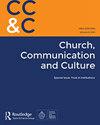对真理的误解
Q1 Arts and Humanities
引用次数: 6
摘要
摘要本文探讨了哲学辩论和哲学外辩论中最常见的关于真理的分歧和误解,然后反思了“后真理时代”的概念,还原了这一诊断,并指出在真理概念的近代史上,我们可能会发现一些值得考虑的积极机遇。本文章由计算机程序翻译,如有差异,请以英文原文为准。
Misunderstandings about truth
Abstract The article explores the most common disagreements and misunderstandings concerning truth, in philosophical as well as extra-philosophical debates, then reflects on the notion of “post-truth era”, reverting the diagnosis, and suggesting that in the recent history of the concept of truth we may find some positive opportunities that deserve to be taken into account.
求助全文
通过发布文献求助,成功后即可免费获取论文全文。
去求助
来源期刊

Church, Communication and Culture
Arts and Humanities-Religious Studies
CiteScore
1.30
自引率
0.00%
发文量
14
审稿时长
21 weeks
 求助内容:
求助内容: 应助结果提醒方式:
应助结果提醒方式:


